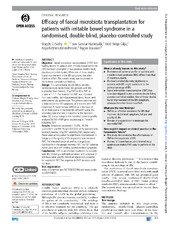| dc.contributor.author | El-Salhy, Magdy | en_US |
| dc.contributor.author | Hatlebakk, Jan Gunnar | en_US |
| dc.contributor.author | Gilja, Odd Helge | en_US |
| dc.contributor.author | Bråthen Kristoffersen, Anja | en_US |
| dc.contributor.author | Hausken, Trygve | en_US |
| dc.date.accessioned | 2020-07-01T13:04:05Z | |
| dc.date.available | 2020-07-01T13:04:05Z | |
| dc.date.issued | 2020 | |
| dc.Published | El-Salhy M, Hatlebakk JG, Gilja OH, Bråthen Kristoffersen A, Hausken T. Efficacy of faecal microbiota transplantation for patients with irritable bowel syndrome in a randomised, double-blind, placebo-controlled study . Gut. 2020;69(5):859-867 | eng |
| dc.identifier.issn | 0017-5749 | |
| dc.identifier.issn | 1468-3288 | |
| dc.identifier.uri | https://hdl.handle.net/1956/23175 | |
| dc.description.abstract | Objective: Faecal microbiota transplantation (FMT) from healthy donors to patients with irritable bowel syndrome (IBS) has been attempted in two previous double-blind, placebo-controlled studies. While one of those studies found improvement of the IBS symptoms, the other found no effect. The present study was conducted to clarify these contradictory findings. Design: This randomised, double-blind, placebo-controlled study randomised 165 patients with IBS to placebo (own faeces), 30 g FMT or 60 g FMT at a ratio of 1:1:1. The material for FMT was obtained from one healthy, well-characterised donor, frozen and administered via gastroscope. The primary outcome was a reduction in the IBS symptoms at 3 months after FMT (response). A response was defined as a decrease of 50 or more points in the total IBS symptom score. The secondary outcome was a reduction in the dysbiosis index (DI) and a change in the intestinal bacterial profile, analysed by 16S rRNA gene sequencing, at 1 month following FMT. Results: Responses occurred in 23.6%, 76.9% (p<0.0001) and 89.1% (p<00.0001) of the patients who received placebo, 30 g FMT and 60 g FMT, respectively. These were accompanied by significant improvements in fatigue and the quality of life in patients who received FMT. The intestinal bacterial profiles changed also significantly in the groups received FMT. The FMT adverse events were mild self-limiting gastrointestinal symptoms. Conclusions: FMT is an effective treatment for patients with IBS. Utilising a well-defined donor with a normal DI and favourable specific microbial signature is essential for successful FMT. The response to FMT increases with the dose. | en_US |
| dc.language.iso | eng | eng |
| dc.publisher | BMJ | eng |
| dc.rights | Attribution-Non Commercial CC BY-NC | eng |
| dc.rights.uri | http://creativecommons.org/licenses/by-nc/4.0/ | eng |
| dc.title | Efficacy of faecal microbiota transplantation for patients with irritable bowel syndrome in a randomised, double-blind, placebo-controlled study | en_US |
| dc.type | Peer reviewed | |
| dc.type | Journal article | |
| dc.date.updated | 2020-01-30T06:15:45Z | |
| dc.description.version | publishedVersion | en_US |
| dc.rights.holder | Copyright 2019 The Authors | |
| dc.identifier.doi | https://doi.org/10.1136/gutjnl-2019-319630 | |
| dc.identifier.cristin | 1784524 | |
| dc.source.journal | Gut | |

